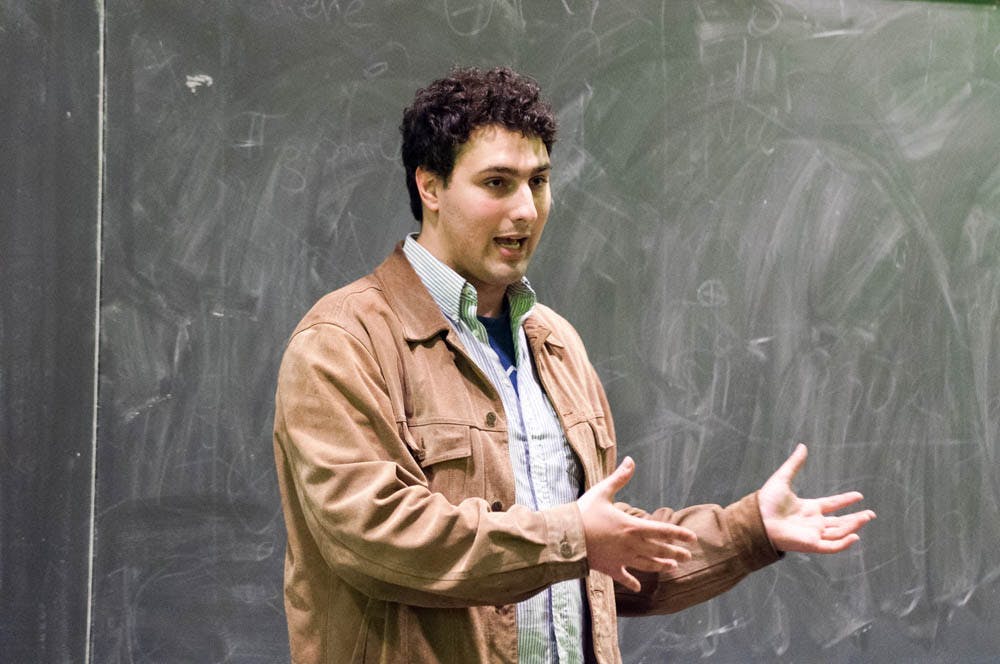Resist Hate Brown, a brainstorming event held in conjunction with Resist Hate RI Tuesday night, allowed students to learn about and discuss how to move forward following the presidential election of Donald Trump. Local organizers from the American Civil Liberties Union, Direct Action for Rights and Equality and Planned Parenthood discussed community engagement and mobilization to an audience of several dozen students in Salomon 001.
Organizer Gabe Zimmerman ’17.5 got the idea of arranging Resist Hate Brown after attending a Resist Hate RI event at Hope High School last Saturday. “It was something that really inspired me,” he said. He left the meeting wanting to immediately “replicate this on Brown’s campus for people who are confused and don’t know what to do in the face of this (election).”
Before representatives and officials spoke about how students can get involved, audience members broke into small groups and answer three questions: What is something you fear about a Trump presidency? What is an action you’re willing to take to resist that feared outcome? And what is a strength you could bring to that fight?
In these groups, many expressed fears regarding the normalization of Trump’s rhetoric and the possibility of increased passivity as people lose the energy to continue resisting. “You don’t really give up on things like this,” said Abby Godino, an organizer from the Rhode Island Working Families Party, in her group discussion.
Following the group discussions, the first speaker on the agenda was Steven Brown, executive director of the Rhode Island branch of the ACLU. Brown’s lecture was focused on taking action at a local level — reminding audience members that states can uphold rights that the federal government doesn’t protect — and that Trump’s power is limited. He recommended calling state and local representatives when issues crop up as “a very simple, but I think very effective, way of making your position known and having an impact,” Brown said.
Rep. Aaron Regunberg ’12, D-Providence, spoke next. “I’m scared, and you’re scared, and we should be scared,” he said. But “we shouldn’t let it paralyze us, … and we shouldn’t lose hope.” Regunberg also focused on the importance of acting on a local level to hold politicians accountable. “Every senator counts,” he said. “We need to put the pressure on our federal delegation” that Democratic constituents are looking for “bold, fierce opposition,” not appeasement.
Zeroing in on an even more local community, Sophia Wright from DARE spoke about how as a university, Brown has resources that could be beneficial to those in need following Trump’s election. Wright passed out a list of actions that Brown could take to show support, including non-compliance with Immigration and Customs Enforcement by the Brown campus police and a commitment to provide housing and sponsor student and employment visas for undocumented members of the Providence community.
Wright also encouraged supporting the Community Safety Act, which works against racial profiling and promotes transparency in policing. “When one person’s life is devalued, all of our lives are devalued,” she said.
Above all, Wright emphasized the importance of educating oneself. “Know when it’s your time to step up and when it’s your time to step back,” she said. “A lot of these issues are not new to communities of color.” She added that learning about these issues is the first step, especially for white people, in building a sustainable resistance against racism and white supremacy in this country.
Lilith Todd ’18, an undergraduate working for Planned Parenthood, highlighted the importance of knowing one’s government. She pointed out that abortion is not protected by the state in Rhode Island, and should Roe v. Wade be overturned, abortion would automatically be illegal in the state.
Similarly, Sabine Adrian ’13, a representative from the Coalition for Safer Rhodes, said that due to the ambiguity in different definitions about what a sanctuary city is, “we don’t know what it means when Mayor (Jorge) Elorza says he wants to make Providence a sanctuary city.”





